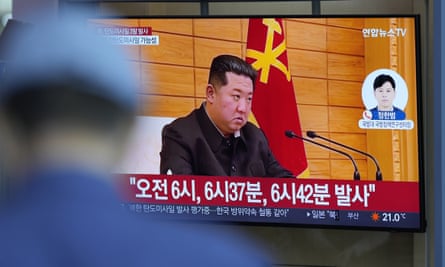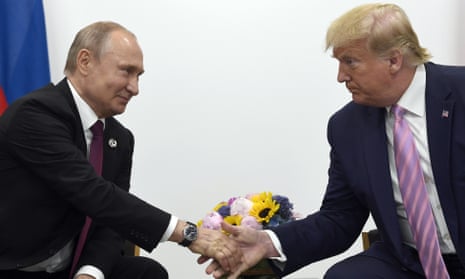Even by Donald Trump’s chaotic standards, the “comprehensive peace agreement” for Afghanistan signed by the US in Doha in February 2020 was a huge own goal.
The pact posited no binding ceasefire, no power-sharing requirements, and no political roadmap. In return for some mumbo-jumbo about al-Qaida, Trump pledged total, unconditional US and Nato withdrawal within 14 months.
This was not peacemaking. This was capitulation. The Taliban could hardly believe their luck.
Trump hoped to benefit politically from “bringing the troops home”, even though the vast majority had already left. He was otherwise wholly indifferent to the fate of the Afghan people.
Military men in the US and UK were aghast. So, too, were diplomats, politicians, aid agencies and analysts familiar with Afghanistan. But their warnings of looming catastrophe were ignored.
Despite being hobbled by official secrecy, two damning reports this month, one by a US public watchdog, the other by the UK parliament’s foreign affairs committee (FAC), lay bare the almost unbelievable incompetence of the two governments.
Boris Johnson and the then British foreign secretary, Dominic Raab, failed to effectively challenge the Doha pact, then failed adequately to prepare for the 2021 withdrawal, the FAC report said.
On 8 July 2021, Johnson blithely told the Commons there was “no military path to victory for the Taliban”. On 15 August, Kabul fell. Chaos reigned. Evacuees died. Dogs were saved. But many UK-employed Afghan staff and workers were not.
Twenty years of nation-building, at a cost of tens of thousands of US, British and Afghan lives, were blown away in a few shameful days. Johnson and Raab should have resigned then, but didn’t. There’s still time, guys.
The report of the US special inspector general (Sigar) blamed the calamity on Trump as well as his successor, Joe Biden, and the then Afghan president, Ashraf Ghani.
Biden was certainly at fault. He should have insisted on renegotiating Doha and kept some US forces at Bagram base, outside Kabul. European Nato allies should have voiced their misgivings more forcibly.
But responsibility lies primarily with the man who set this lethal geopolitical car crash in motion. While boasting of his prowess as a dealmaker, Trump caved to a gang of feudal warlords, who promptly defaulted to tyranny.
Today’s ongoing Afghan tragedy is but one aspect of Trump’s toxic legacy. The negative impact of his presidency is still being felt around the world – and time is running out to dispel its noxious after-effects.
In two years’ time, Trump or a Trump-endorsed Republican clone could win back the White House. His reactionary, disruptive America First agenda may once again dictate the way the US deals, or fails to deal, with the big global challenges of the day.
This dire prospect is rendered more likely by Biden’s apparent inability, seen in Afghanistan, to fundamentally shift the dial on a range of key international issues.
It’s little wonder, for example, that occupation-related violence between Israelis and Palestinians in the West Bank and elsewhere is at its highest level since 2014, according to the UN.
Trump abandoned peace efforts and the internationally preferred two-state solution, ignored the Palestinian Authority, and promoted the business-focused “Abraham Accords” between Israel, the UAE and Bahrain.
Since neither Gulf state threatened Israel, this was hardly the historic breakthrough he claimed. But it did further marginalise the Palestinians while helping legitimise the “apartheid crimes”, as characterised by Human Rights Watch, of successive Israeli governments.
Biden recently condemned yet another expansion of illegal West Bank settlements. But he has done little to revive the peace process. Maybe this will change when he visits Israel later this year. Maybe not.
Biden also appears to have bowed to Israeli pressure over Iran. Trump stupidly reneged on the 2015 nuclear deal with Tehran. Since then, Iran has reportedly moved steadily closer to acquiring nuclear weapons capability.
Trump’s blunder, coupled with repeated Israeli and US assassinations of prominent Iranians, has increased tensions. Yet despite a firm promise, Biden has been unable to revive the deal. Now it seems he’s giving up.

Trump made a fool of himself trying to charm the nuclear-armed North Korean dictator, Kim Jong-un. His photo-op summitry boosted Kim’s prestige for zero return. Kim has lately been firing off ballistic missiles like there’s no tomorrow. The way he’s going, there may not be.
Yet North Korea is another tinder-box issue on which Biden has nothing new to say. His visits to South Korea and Japan last week underlined how much he has neglected China and the Indo-Pacific region, ostensibly his top overseas priority.
Trump’s attempts to pressure China punished America. He picked trade fights that hurt US exporters and boycotted the Trans-Pacific Partnership – more own goals.
Now Biden is belatedly trying to pick up the pieces, reassuring Taiwan of US military backing, strengthening regional alliances, and launching a multi-country an “Indo-Pacific Economic Framework” to counter China.
While some of his problems are self-inflicted, Biden’s struggle to repair the global damage wrought by Trump’s four-year rampage has been made infinitely more difficult by Russia’s war in Ukraine.
Trump obsequiously courted Vladimir Putin. He obligingly trashed Nato and the EU. And he clashed with Putin’s arch-foe – Ukraine’s leader, Volodymyr Zelenskiy – whom he notoriously (and impeachably) pressured in a bid to discredit Biden.
Trump, in office, seemed inexplicably beholden to the Kremlin mafia boss. He still does.
Now Putin’s brutal imperialism threatens in turn to damage Trump’s arch-foe – Biden – by derailing his international and domestic priorities and, if Russia wins, discrediting American global leadership.
The symmetry is striking. Horror in Ukraine, directed from Moscow, nobbles Joe’s chances in 2024. It’s almost like the Don and the Donald are working together. Perish the thought!

